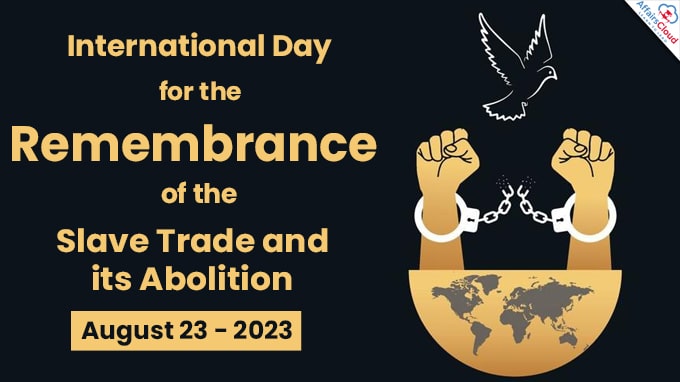 The United Nations (UN)’s International Day for the Remembrance of the Slave Trade and its Abolition is annually observed on 23rd August, to remind people of the tragedy of the transatlantic slave trade during colonial rule and to raise awareness about the abolition of slave trading and related practices.
The United Nations (UN)’s International Day for the Remembrance of the Slave Trade and its Abolition is annually observed on 23rd August, to remind people of the tragedy of the transatlantic slave trade during colonial rule and to raise awareness about the abolition of slave trading and related practices.
- This date also pays tribute to those who worked hard to abolish the slave trade and slavery throughout the world.
The annual observance of the day is led by the United Nations Educational, Scientific and Cultural Organization (UNESCO).
Background:
i.In 1997, the UNESCO executive board on its 29th session of the General Conference adopted the resolution 29 C/40 and proclaimed the 23rd of August every year as the International Day for the Remembrance of the Slave Trade and its Abolition.
ii.In 1998, a circular from the Director-General of UNESCO was sent to invite the Ministers of Culture of all Member States to organise events every year on this day.
iii.The day was first observed in Haiti on 23rd August 1998 and Gorée Island in Senegal on 23rd August 1999.
Why August 23?
It was on that day, the self-liberated enslaved people on the island of Saint Domingue (today Haiti and the Dominican Republic) rose up against French colonial rule, and played a crucial role in the abolition of the transatlantic slave trade.
What is slave Trading?
i.The slave trade refers to the transatlantic trading patterns which were established as early as the mid-17th century.
ii.The transatlantic slave trade involved the transportation of enslaved African people by slave traders, mainly to the Americas.
iii.Trading ships would set sail from Europe with a cargo of manufactured goods to the west coast of Africa. There, these goods would be traded, over weeks and months, for captured people provided by African traders.
Note: On 25th March 1807, the British government passed an Act of Parliament abolishing the transatlantic slave trade, banning trading enslaved people throughout the British Empire.
Haitian Revolution:
i.Haitian Revolution, was a series of conflicts between 1791 and 1804 between Haitian slaves, colonists, the armies of the British and French colonisers, and a number of other parties.
ii.The revolt commenced on the night of 22 to 23 August 1791 in Saint Domingue, which witnessed the beginning of the revolution that would play a crucial role in the abolition of the transatlantic slave trade. It ended in 1804.
iii.The rebel forces continued to fight for their freedom and on 1st January 1804, Haiti was declared an independent republic.
iv.The Haitian Revolution created Haiti, the 2nd independent country in the Americas after the United States of America (USA), which became independent in 1783.
v.The Haitian Revolution is the only successful slave revolt in history, and resulted in the establishment of Haiti, the first independent black state in the World.
The Slave Route:
i.“Routes of Enslaved Peoples: Resistance, Liberty, and Heritage” Project was launched by UNESCO in 1994 in Ouidah, Benin to examine the foundations, forms of operation, and consequences of the slave trade and slavery in different regions of the world.
ii.It is a flagship programme of UNESCO and the International Scientific Committee (ISC). The main function of the ISC is to advise UNESCO on the implementation of the programme.
iii.The ISC of the project consists of 20 members appointed by the Director-General of UNESCO.
Note: In 2024, the Routes of Enslaved Peoples project will celebrate its 30th anniversary.
2023 events:
On 23rd August each year, the National Maritime Museum, in Greenwich, London, the United Kingdom (UK) commemorates International Slavery Remembrance Day and the long struggle for liberation throughout the world.
- The Museum has organised various events from talk shows to tours to commemorate the day.
Related Observance:
i.The UN International Day of Remembrance of the Victims of Slavery and the Transatlantic Slave Trade is annually observed on 25th March across the globe to honour and remember the victims, who suffered and died at the hands of the brutal slavery system.
ii.The United Nations General Assembly (UNGA) established the Outreach Programme on the transatlantic slave trade and slavery in 2007. The 2023 Theme of the Remembrance programme was “Fighting slavery’s legacy of racism through transformative education”.
About United Nations Educational, Scientific and Cultural Organization (UNESCO)
Director General– Audrey Azoulay
Headquarters– Paris, France
Founded on– 6 November 1945




